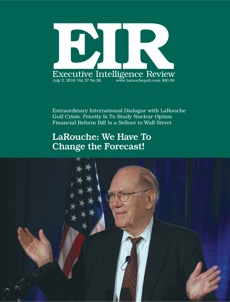LaRouche: We Have To Change the Forecast!
by Lyndon H. LaRouche, Jr.
Remarks by Lyndon LaRouche to a private meeting in Washington, D.C., on June 23. “What we’re looking at,” he said, “is the threat of a general breakdown crisis of the trans-Atlantic economies. It will be centered in Europe. If the current President of the United States remains in office during this period, it will be a disaster here. And a disaster in the trans-Atlantic region, particularly, the north trans-Atlantic region, will have obviously devastating impact not only in the trans-Atlantic region, but a collapse of the trans-Atlantic region will mean a collapse also in the Pacific region.” What can prevent such a disaster? “What is required, without which we’re not going to get out of this thing, is a general change in the world economy, by putting the world economy, starting with the trans-Atlantic region, into bankruptcy reorganization.”
International
Afghan Fiasco: Does President Obama Need a Hearing Aid?
by Ramtanu Maitra
The sacking of Gen. Stanley McChrystal does not signify any change in U.S. policy. That means the grinding war will continue, leading to further destruction of the U.S. military, yielding nothing but more opium from the fields of Afghanistan, and fattening the wallets of City of London and Wall Street bankers.
LaRouche: Wipe Out the Afghan Opium Trade
National
Obama Must Go! Dodd-Frank ‘Financial Reform’ Bill Is a Sellout to Wall Street
by Jeffrey Steinberg
The efforts by a handful of Congressmen and Senators to restore the Glass-Steagall law was killed by Sen. Christopher Dodd and Rep. Barney Frank before the Senate and House bills were voted on. Dodd and Frank had the full backing of President Obama and his economic team.
From the Senate: Obama Is a Liar
Rogers Campaign Shows Texas Dems the Future: And It Isn’t Obama!
by Harley Schlanger
Economics
Crisis in the Gulf: Serious Study of Nuclear Option Is Highest Priority
by Laurence Hecht
Serious consideration for the design and deployment of a peaceful nuclear explosive to seal the BP oil well is currently mandatory.
Sealing the BP Well: Expert Explains Use of Nuclear Device
From an interview by LPACTV with nuclear physicist Dr. Milo D. Nordyke. He is the leading U.S. expert on peaceful nuclear explosions, scientist emeritus of Lawrence Livermore National Laboratory, and a veteran of the Operation Plowshare program for the peaceful use of nuclear explosions.
Feature
An Extraordinary International Dialogue with Lyndon LaRouche
by Lyndon H. LaRouche, Jr.
On April 29, Lyndon LaRouche engaged in this fascinating conversation with a group that had gathered in New York to discuss various elements of LaRouche’s proposed Four-Power Agreement and related issues. The group was comprised of policy-makers as well as academicians from Stanford University, University of California at Berkeley, Massachusetts Institute of Technology, Princeton University, and Columbia University. Representatives from Russia, China, and India also participated. A number of journalists were also invited to audit the proceedings, although they did not have speaking rights.
Editorial
Who Will Stand Up Against Obama?



